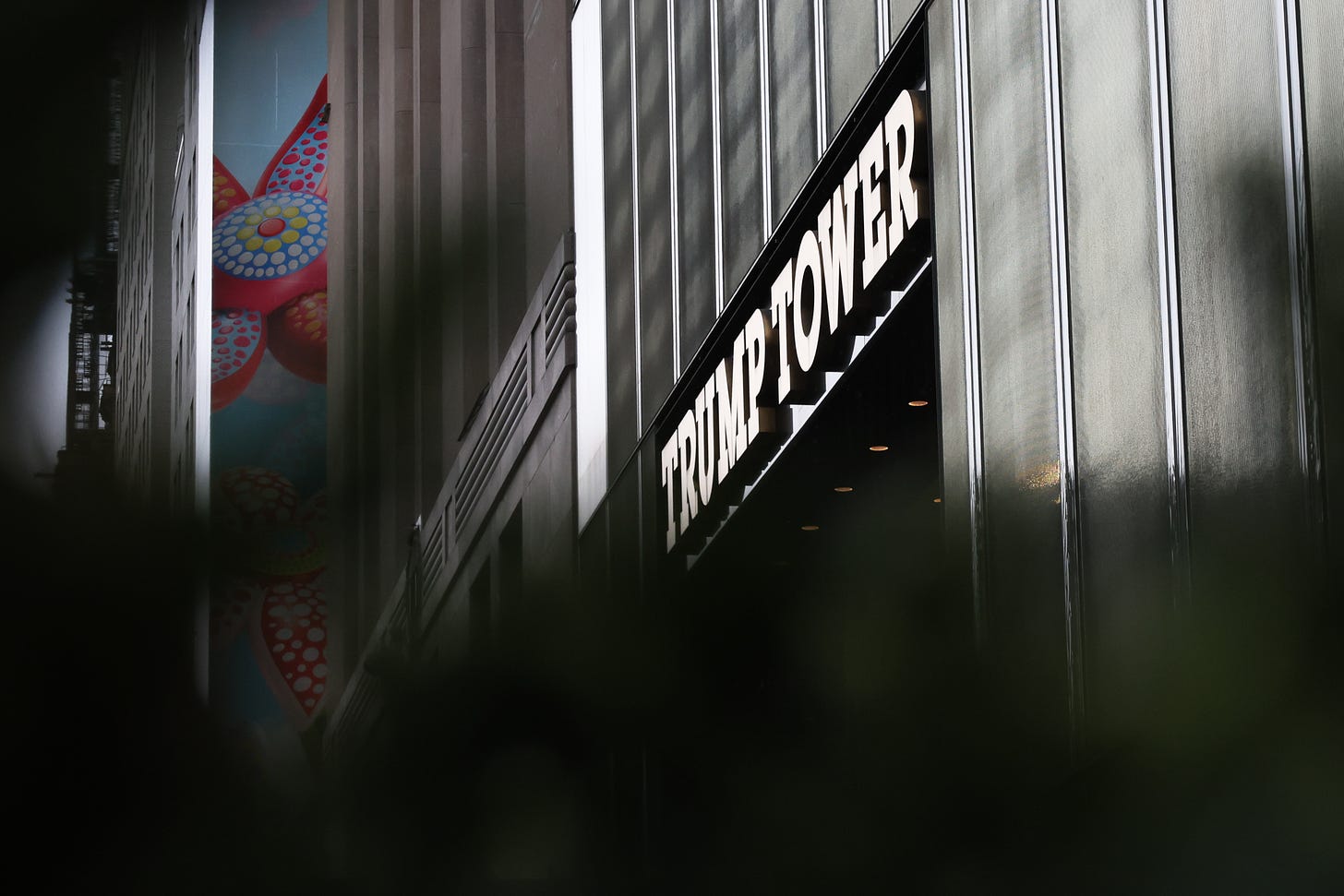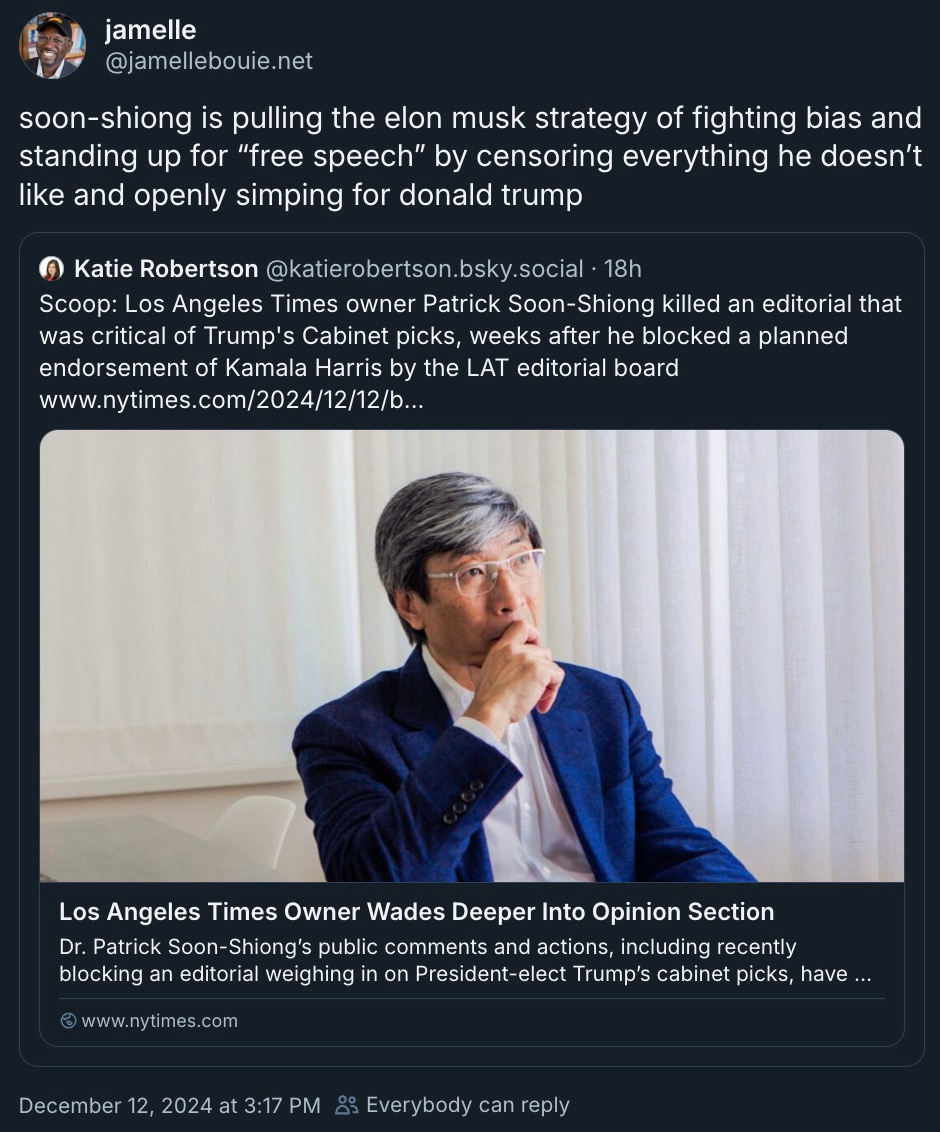Ethics? Lol.
Trump paid lip service to conflict-of-interest ethics arrangements the first time around. So far this time, he’s not even doing that.
Great things coming at Health and Human Services, where Robert F. Kennedy Jr. is hard at work contemplating decisions like “which antivax lawyers to hire,” per the NYT:
The lawyer helping Robert F. Kennedy Jr. pick federal health officials for the incoming Trump administration has petitioned the government to revoke its approval of the polio vaccine, which for decades has protected millions of people from a virus that can cause paralysis or death.
That campaign is just one front in the war that the lawyer, Aaron Siri, is waging against vaccines of all kinds.
Bill’s out today, but in his place below we’ve got a good look at Trump’s China posture from Bulwark contributor Gabe Schoenfeld of the Niskanen Center. First up, though: Is the president-elect even going to pretend to care about his business conflicts of interest this time around? Happy Friday.

I Have a Tower to Sell You—In Saudi Arabia
by Andrew Egger
The first time Donald Trump became president, with questions swirling over how he would avoid conflicts of interest involving his business empire, he announced his companies would not enter any foreign deals during his term.
This week, with the transition well underway, Trump’s son Eric, an executive vice president of the Trump Organization, made an altogether different type of announcement: the unveiling of a new Trump Tower in Jeddah, Saudi Arabia.
We don’t yet know the specifics of the ethics arrangement Trump will roll out for his second White House stint. (The transition declined to comment for this article.)1 But the Jeddah announcement—and the muted response to it—make two things clear.
One, the Trumps are showing even less interest in rearranging their businesses to address ethics concerns this time around. “Should I stop all expansion? I don’t know what the answer is,” Eric Trump told the Wall Street Journal back in October. “I tried to do everything right in 2016, and I got very little credit for it.”
And two, Trump’s critics—understandably preoccupied with other potential transgressions like “Trump jailing opponents”—barely even seem to have the bandwidth to care.
“The starting point in 2017 for analyzing the government’s ethics problems was to ask, ‘What has broken?’” Walter Shaub, the former director of the United States Office of Government Ethics, told The Bulwark Thursday. “I think the starting point in 2025 is to ask, ‘What remains?’”
[Update, 10:43 a.m., December 13, 2024: After this newsletter was published, the Trump transition team sent a statement waving off questions about conflicts of interest. “President Trump removed himself from his multi-billion-dollar real estate empire to run for office and forewent his government salary, becoming the first President to actually lose net worth while serving in the White House,” spokeswoman Karoline Leavitt said. “Unlike most politicians, President Trump didn't get into politics for profit—he’s fighting because he loves the people of this country and wants to make America great again.”]
It’s hard to remember now, but Trump’s potential business ethics problems loomed large at the outset of his first term—before they were elbowed out of the spotlight by other controversies like Russiagate and the firing of FBI Director James Comey. As early as January 2017, ethics officials like Shaub were warning that the steps Trump was taking to stave off conflicts of interest were woefully insufficient. By July, Shaub had resigned.
“It was in many ways a disaster that didn’t start out great and got worse,” said Noah Bookbinder, president of the watchdog group Citizens for Responsibility and Ethics in Washington. “There was no intention to sell the business interests, so he was always gonna know what his interests were, so he could benefit them as he saw fit.”
Bookbinder noted that Trump made good money during his first term off the association of his business with the presidency. “It just sort of became business as usual that industries that wanted to curry favor with him would hold an event at one of his resorts, and politicians would hold fundraisers at his properties,” he said. “That was just sort of seen as how you get in with Donald Trump, which is, you know, I think a pretty disastrous place for the presidency to be.”
Those transgressions feel almost quaint compared to what we could get in this coming presidency. In addition to his real estate empire, Trump has embarked on a host of business ventures that are even more potentially exposed to conflicts of interest, or that erase the lines between his political and business interests almost entirely.
Trump has been involved this year in the launch of World Liberty Financial, a cryptocurrency protect notable, as we reported back in September, not only for its unusually scammy structure (even for a crypto firm!) but for its presence in an emerging industry that Trump will play a major role in shaping during his second term.
And then there’s the side hustles that derive all their value from Trump’s political brand: the Trump trading cards, the Trump sneakers, the Trump watches, the Trump perfumes. Back in 2017, Trump’s lawyers were assuring the public that the Trump Organization would not reference or in any way exploit for branding purposes Trump’s role as president. Today, the president-elect hawks perfume with a picture of Jill Biden: “a fragrance your enemies can’t resist!”
Most significantly, much of Trump’s personal net worth is currently held in stock in Trump Media & Technology Group, the company that owns his social media company, Truth Social. That company, unlike the Trump Organization, is publicly traded, making it a perfect conduit for anyone eager to curry favor with the president. It is, as Bookbinder puts it, a disaster in waiting.
“Any kind of wealthy interest, whether it’s a foreign government or wealthy individual or a company, can buy a large number of shares in Trump Media,” Bookbinder said. “And if you buy a bunch of shares quickly, it will likely drive up the value of the stock. And if you drive up the value of the stock, you make Donald Trump a lot wealthier. So that is a very direct way to put vast quantities of money in his pocket, often with nobody publicly knowing—but he could know about it.”
All these problems were known during the presidential campaign. But Trump gambled—correctly, it turns out—that Americans wouldn’t hold them against him.
Xi Will Be Loved
by Gabriel Schoenfeld
Another day, another disquieting marvel. As CBS News first reported and as Trump spokesperson Karoline Leavitt has confirmed, President-elect Donald Trump invited Chinese leader Xi Jinping to his second inauguration. “This is an example of President Trump creating an open dialogue with leaders of countries that are not just our allies but our adversaries and our competitors too,” said Leavitt. “He is willing to talk to anyone.”
Xi subsequently announced that he would not attend, but that decision is far less important than what this invitation signifies for America’s relations with its allies in Asia. How does one think the Japanese, Koreans, Filipinos, and Taiwanese received the news about this unprecedented invitation?
Another pertinent question is: What does Trump think he’s doing? Is this just more evidence of his insatiable desire to be at the center of world attention? Or is it something else?
Trump, up until now, has been getting credit for choosing China hawks for key foreign policy positions, including Sen. Marco Rubio for secretary of state and Rep. Mike Waltz for national security adviser. But the president-elect himself may prove to be more of a dove.
Trump is a fervent admirer of Xi, praising him as “a brilliant guy” who “controls 1.4 billion people with an iron fist.” The incoming president is above all else transactional and guided by his faith that he can cut a deal with anyone, especially the strongmen he so respects.
In his first term, this belief led to two summits with North Korea’s absolute ruler Kim Jong Un in a bid to rein in the Hermit Kingdom’s nuclear weapons program. No deal was formalized. But Kim got a huge boost in stature and Trump got to emit a blast of hollow boasts, as he did upon his return from Asia: “Just landed—a long trip, but everybody can now feel much safer than the day I took office,” Trump said. “There is no longer a Nuclear Threat from North Korea.”
Fact check: false. A nuclear threat from North Korea not only persists but has only worsened with the passage of time.
With respect to China, we may now witness similar vicissitudes.
Trump, after all, has vowed to impose 60 percent tariffs, or even higher, on Chinese goods. But the invitation to Xi may be a prelude to reversing course on a series of promises that, if kept, will hurt the Chinese economy but also severely injure our own.
Perhaps constant Mar-a-Lago companion Elon Musk has been whispering in Trump’s ear. Musk’s business interests in China are extensive—Tesla is both produced in and heavily consumed by China—and the American billionaire receives an emperor’s welcome when he visits. Trump has a tendency to follow the advice of whoever is last to get his attention. And Musk certainly has Trump’s ear.
Of our Asian friends, Taiwan is the country that should be most immediately anxious. Trump has already signaled that he could care less about the island’s security. “You know, Taiwan, they stole our chip business . . . and they want protection,” is what Trump recently told Joe Rogan. That is an implicit suggestion that the United States will not come to Taiwan’s aid if it is attacked by the mainland, which can only serve to encourage Xi’s aggressive plans.
Wars have been raging in Europe and the Middle East. China, arming itself to the teeth, remains a major threat to the peace of Asia. A volatile world needs a stable America standing tall for freedom and democracy. But starting on January 20, 2025, the United States will jettison the moral dimensions of our traditional statecraft and once again become predictably unpredictable. Trump’s surprise invitation of Xi to his inauguration is another signpost along that dangerous path. Xi will end up watching the inauguration from Beijing, but he may be among those who applaud the loudest.
Quick Hits
ANOTHER KIND OF SELF-MADE BILLIONAIRE: Sometimes all it takes to break a wild story in our deeply stupid age is a little reportorial curiosity. The opening grafs of this New York Times piece heap marvel upon marvel:
President-elect Donald Trump’s incoming Middle East adviser, Massad Boulos, has enjoyed a reputation as a billionaire mogul at the helm of a business that bears his family name.
Mr. Boulos has been profiled as a tycoon by the world’s media, telling a reporter in October that his company is worth billions. Mr. Trump called him a “highly respected leader in the business world, with extensive experience on the international scene.” . . .
In fact, records show that Mr. Boulos has spent the past two decades selling trucks and heavy machinery in Nigeria for a company his father-in-law controls. . . . There is no indication in corporate documents that Mr. Boulos, a Lebanese-American whose son is married to Mr. Trump’s daughter Tiffany, is a man of significant wealth as a result of his businesses. The truck dealership is valued at about $875,000 at its current share price. Mr. Boulos’s stake, according to securities filings, is worth $1.53.
As for Boulos Enterprises, the company that has been called his family business in the Financial Times and elsewhere, a company officer there said it is owned by an unrelated Boulos family.
The hubris here is jaw-dropping. Boulos appears to have lied repeatedly both to his famous in-laws and to a string of news organizations that apparently deemed fact statements like “Massad Boulos owns Boulos Enterprises” too obvious to check. The whole thing is worth a read, not least to enjoy Boulos’s squirming attempts to convince the Times’s reporters that the whole thing is a media mistake he played no role in encouraging. And as the Times drily notes, this massive oversight does not reflect so well on the transition’s vetting efforts. And since you’re wondering: No, Boulos’s appointment is not Senate-confirmed.
One wonders how the president-elect will take all this. Lying to the media is one thing—but lying to Trump?
POOR CHOICE OF WORDS: Earlier this week, Sen. Elizabeth Warren (D-Mass.) created a hubbub when she weighed in on the recent murder of the CEO of a health insurance giant, condemning the violence but adding that “people can only be pushed so far.” Republicans and even some Democrats quickly took exception: “This is completely inappropriate and dangerous from a senator,” tweeted House Majority Leader Steve Scalise, who was himself a victim of political violence back in 2017. Yesterday, Warren tried to clean up her comments, telling Politico that “I should have been much clearer that there is never a justification for murder.” (True!) Other Democrats denounced the murder Thursday as well, per Politico: “No one’s condoning this,” said Rep. Brad Schneider (D-Ill.) “It was a horrible murder, a tragic loss for his family.” Rep. Troy Carter (D-La.) added: “We know that there are people suffering, there’s great challenges in healthcare. There’s great challenges, and people have, in fact, been wronged, but a process of governance is the way to address that, not violence.”
Cheap Shots
See update below.








I can't get my panties in a wad about Warren's "poor choice of words." The motives of the shooter are relevant to any discussion, and *a* thing people are discussing is whether the healthcare situation in this country is driving people to desperation. She's not wrong to bring it up, and this immediate criticism is the kind of thing we've been decrying for years, when it's on the left. People simultaneously want politicians who "tell it like it is" and then condemn them for saying what many people are thinking.
No reasonable person would think for even a second that Warren was in any way condoning or excusing murder. I'm weary of the performative outrage.
This administration is going to be an ethics nightmare. Wait until we see how Trump manipulates the tariffs to benefit his friends and punish his enemies.
Also, "Mr. Boulos’s stake, according to securities filings, is worth $1.53." When I first read that line I thought $1.53 billion? $1.53 million? I guess it is one dollar and fifty three cents. LOL.